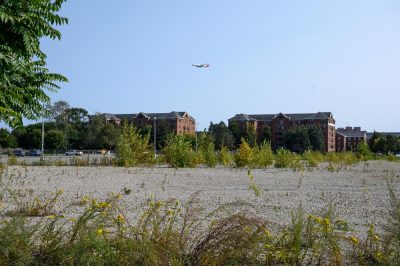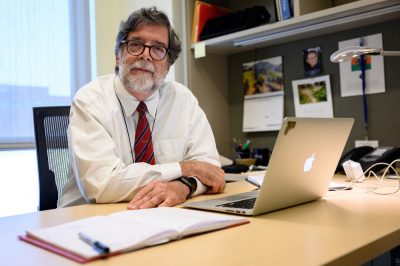
The Boston Planning and Development Agency approved a 6.1 million square foot development project on Sept. 14, despite major socioeconomic and ecological concerns from organizations, residents and academics in the Dorchester area.
The Dorchester Bay City Planned Development Area Master Plan, a plan to build 21 buildings headed by Accordia Partners — a real estate development group — was approved to begin its 15- to 20-year-long construction project in Dorchester. Dorchester Bay City has been described by the BPDA as a project that will guarantee affordable housing, provide sustainable living and improve flood management.
However, some organizations and residents in Dorchester have concerns that DBC should be more equitable. An assessment such as the Affirmatively Furthering Fair Housing assessment, a test designed to “consider impacts on area residents historically discriminated against,” should have been conducted prior to its approval.
In 2020, then-Mayor Marty Walsh announced a commitment that Boston developers would be required to use the AFFH assessment tools to address “past histories of exclusion.” BPDA Interim Housing Manager Caitlin Coppinger told Boston.com that the master plan for DBC did not require the assessment to be completed in order to be approved initially but committed to doing so for individual buildings at a later date.
Faculty members at the University of Massachusetts Boston, advocacy groups around Dorchester and concerned residents have engaged in a four-year-long dialogue to voice their concerns and provide suggestions to the developers for ways to make the development project more equitable.
A common concern among some residents is that DBC has overlooked the surrounding diverse population, the potential displacement of low-income residents and the reduction of available affordable housing. These concerns were outlined and voiced to Accordia but many were left dissatisfied with the developers’ response.
Up until the proposal was accepted, concerned residents sent emails urging the BPDA not to accept the proposal until an AFFH assessment had been conducted and to ask the City to honor Walsh’s commitment.
Some faculty members at UMass Boston learned about the development in 2019 when the Board of Trustees leased a portion of land owned by the University to Accordia Partners. After meeting with the developers and then-Interim Chancellor of UMass Boston Katherine Newman just weeks after the announcement, the faculty drafted a letter to Newman detailing potential concerns.
Concerns
Kenneth Reardon, the chair of the Department of Urban Planning and Community Development at UMass Boston, and Paul Kirshen, professor of climate adaptation, outlined within the letter that the current legally required percentage of the development dedicated toward affordable housing may not be enough to properly mitigate the effects of displacement, especially because Dorchester residents and business owners were already facing intense displacement pressures.
“I think the amount of quote-unquote ‘affordable housing’ that this project features is woefully inadequate,” Reardon said. “We should have required a much more significant and substantial [amount] set aside for permanently affordable housing … it’s a really tragic missed opportunity.”

The BPDA requires 13% of units to be designated as affordable housing in large-scale development projects throughout Boston, and DBC will designate 20% of units as affordable. However, Reardon said that because the specific neighborhoods surrounding the proposed site for DBC had lower household incomes compared to the rest of Boston, there should be around 40% of units designated as affordable housing for this specific project.
“That should be the standard we shoot for,” Reardon said. “I don’t think anybody who’s looked at the housing crisis facing the city believes we can resolve it with the kind of effort that this project reflects.”
In order to determine the full extent of what the consequences could be, Reardon suggested in the letter to Newman that a housing consultant be hired to conduct a full analysis. Weeks later, at Newman’s request, Reardon provided a list of nine urban real estate consulting firms that Accordia could employ. To Reardon’s knowledge, no firm was ever hired.
Kevin Murray, an independent racial equity consultant and former interim chief of the Massachusetts Association of Community Development, said DBC “could have been developed in a way that prioritizes affordable housing for people living in the area.”
“To me, it’s not clear that it’s taking affordability into account enough to not have a negative impact,” Murray said. “Oftentimes, these large-scale development projects end up increasing housing prices in ways that hurt people that are already living in the neighborhood. There’s been a lot of that in Boston.”
Markeisha Moore, representative of Dorchester Not for Sale, an activist group advocating for displaced residents, said she is concerned about the affordability of the neighborhood if the development were to occur.
“They build these developments in our neighborhoods, but we can’t afford to live there and then it raises the price of the things that we have been trying to afford,” Moore said. “Right now, Boston is super expensive, and people are struggling just to stay where they are, just to have housing.”
Moore, along with many residents, expressed fear that Dorchester will face the same fate of South Boston after the development of the Seaport district.
“We’re going to have a whole other Seaport … Seaport was supposed to be all inclusive also, all different incomes, we’re supposed to be over there and look at it,” Moore said. “A lot of these new developments are not family friendly, because you know why, they don’t want the families of Boston there.”
Another concern among residents is the potential unforeseen environmental impact of the development.
Reardon also said there may be “potential unintended consequences” of a large-scale development in an “environmentally fragile” part of the city.
Although Accordia conducted extensive research to determine the environmental impact of the development, a further examination regarding the extent of the impact to surrounding communities needed to be conducted, Reardon and Kirschen wrote in the letter.
Surrounding Dorchester communities of the proposed development site are considered environmental justice communities, which Mass.gov defines as minority communities who are disproportionately affected by environmental hazards.
Hessann Farooqi, advocacy director at Boston Climate Action Network, said Dorchester communities are especially vulnerable to ecological hazards.
“Coastal flooding is a key concern from Dorchester and, of course, like any issue, the folks who have the least income are also going to have the least stability to recover from coastal flooding and related disasters,” Farooqi said.
Accordia has stated within their development plan that they will raise the elevation of the part of the development to account for flooding. However, Reardon said, it is not the flooding that is concerning, but is instead the increase in elevation of the development that could result in water throughout Dorchester Bay moving at a faster rate.
“That could have a very deleterious effect and we think that [Accordia] initially focused most of their environmental assessment on the footprint of their development itself without looking in, I think, a reasonable way at the impact area surrounding the site,” Reardon said.
Response
After Reardon and Kirshen sent the first letter to Newman, there was no word on whether Newman sent the letter to Accordia or if there was any positive response from the developers to any of the concerns outlined. As a result, faculty members grew more concerned about the development.
“We had an obligation to our own constituents as well as the community to make sure the public interest was being served so we followed up the letter with this resolution,” Reardon said.
The resolution, which raised similar concerns to those contained in the letter, was passed in December 2019 by the elected representatives of the UMass Boston faculty. Heike Schotten, a UMass Boston professor and faculty member involved in the draft, wrote in an email that Newman openly opposed the resolution during the December vote.
Moore said Accordia met with some civic organizations composed of homeowners, However, she did not think they were representative of those who may be negatively affected by the development project.
“People who are on the civic committee, they’re going to be less affected by it … they own their homes” Moore said. “I’m speaking for folks who are renters, because they don’t have the means to own their own homes and I want to make sure they have the means to stay in the city of Boston.”
Reardon said Accordia first contacted local homeowner associations for their community consultation meetings.
“The demographic is very different in terms of income and race,” Reardon said. “I went to two of the meetings and they were overwhelmingly white, very few people of color. That is not the demographic of the neighborhood that we live in.”
Despite concerns raised through the letter, resolution and meetings, Accordia filed its letter of intent to move forward with the proposal process on March 5, 2020.
In December 2020, UMass Boston faculty drafted solutions to the concerns they had been voicing, and organizations on campus that represented nearly 2,500 faculty and staff members and 16,000 students voted on the proposal. The concerns were sent to the BPDA, the city and Accordia. Schotten wrote in an email that their concerns received “zero response.”
The extent of the citizen opposition is reflected in the public comments for the development project that took place up until the day the proposal was approved by the BPDA.
Diana Pisciotta, president of Denterlein, a public relations firm working with Accordia, wrote in an email that there is an “extensive list of the positive benefits associated with the project on the site,” which include “new affordable housing, improved coastal resiliency, new public open space” and more.
“As a very large project, we do expect to move forward in implementing the master plan over a many year period,” Pisciotta wrote.
Around 255 individuals sent emails voicing their opposition to the development as of Sept. 29. The majority of these individuals are residents of Dorchester or know people who will be directly affected by this development.
“We’ll unfortunately put this project down in the urban planning history books as one of the greatest missed opportunities of contemporary Boston planning and development,” Reardon said.
















































































































